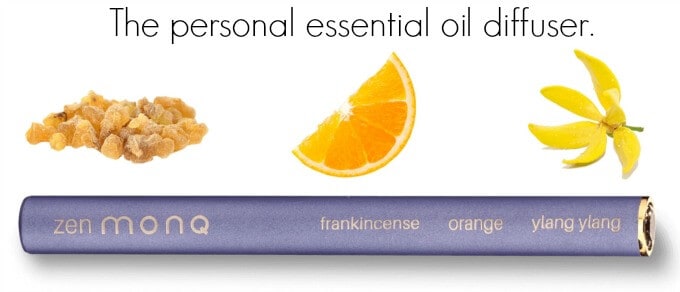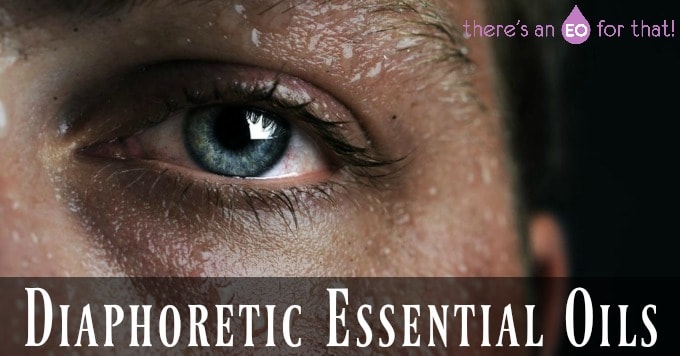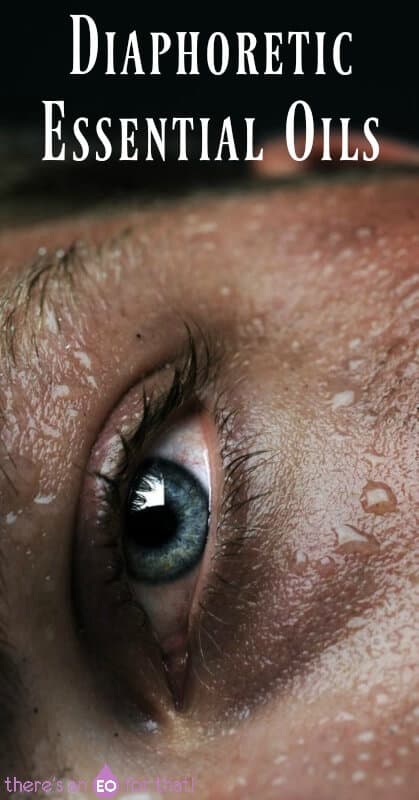Whether you’re suffering from a cold, the flu, or just a bad fever, knowing about diaphoretic essential oils and how to use them can help purge illness and boosts your body’s ability to kill off what ails it.
A diaphoretic in the form of an herb or essential oil will help induce perspiration. As a result, healthy circulation is restored which helps the body dispel fever and chills while eliminating toxins through sweat glands all over the body.
A strong diaphoretic is known as a sudorific.
Diaphoretics assist the body in a number of ways:
• Assists the elimination of toxins and general excretory functions of the skin
• Relieves body aches and muscular tension
• Relieves head colds, headache, and congestion caused by cold
• Relieves inflammation, stagnation, and congestion caused by cold
Using diaphoretic herbs or essential oils can cause perspiration by:
• Stimulating the peripheral sensory nerves which relax and dilate tiny capillaries and blood vessels. This then boosts circulation near the skin’s surface and then throughout the entire body. This increase of blood flow results in increased perspiration.
• Diaphoretics also stimulate the medulla which are known to control the sudoriferous glands.
• As the diaphoretics enter the circulatory system, they are then excreted through the sudoriferous glands through sweat and oil where they then further stimulate perspiration.
Diaphoretic Essential Oils
There are two types of diaphoretics:
• Warming diaphoretics
• Cooling diaphoretics
Warming diaphoretics are often used to treat the common cold and will disperse excess wind, cold, and dampness from the body.
Warming diaphoretic essential oils include:
• Angelica
• Basil
• Cardamom
• Cinnamon (bark and leaf)
• Clove
• Eucalyptus
• Ginger
• Rosemary
• Thyme
Cooling diaphoretics are effective for treating high fever, sore throats, and inflammation. They are often alterative (cleansing for the blood) and will help the body dispel toxins.
Cooling diaphoretic essential oils include:
• Coriander
• German chamomile
• Grapefruit
• Helichrysum
• Lavender
• Lemon
• Manuka
• Peppermint
• Roman chamomile
• Spearmint
• Tea tree
• Yarrow
How to Use Diaphoretic Essential Oils
You can utilize diaphoretic essential oils during times of cold, flu, fever, or chills using the following methods:
• Diffuse the appropriate oils (10-15 drops) for 30 minutes every 2 hours (you can shop for diffusers here)
• Directly smell from the bottle, an anointed tissue, or through a salt inhaler (or nasal salt inhaler) for 3 deep breaths as often as needed
• Apply the appropriate essential oils (properly diluted) to the corresponding vita flex points
• Apply diluted oils to the forehead, temples, neck, and chest
• Run a bath with Epsom salts and the appropriate essential oils
You can learn about max dilutions for essential oils HERE.
You can learn more about vita flax points and where they are HERE.
You can learn more about essential oils for babies and children HERE. You CANNOT use certain essential oils for certain age groups so please refer to this post before using essential oils.
Have you ever used diaphoretic essential oils to induce sweating? What have been your favorites?
You may also enjoy reading:
7 ALL NATURAL FLU REMEDIES FOR QUICK RECOVERY
MY TOP 5 PREVENTATIVE COLD AND FLU REMEDIES
Essential Oils for Boosting The Immune System and Fighting Cold and Flu
Immune Boosting Blend for Colds and Flu
 This post contains affiliate links. We are a participant in the Amazon Services LLC Associates Program, an affiliate advertising program designed to provide a means for us to earn fees by linking to Amazon.com and affiliated sites. Please read my full disclosure and disclaimer.
This post contains affiliate links. We are a participant in the Amazon Services LLC Associates Program, an affiliate advertising program designed to provide a means for us to earn fees by linking to Amazon.com and affiliated sites. Please read my full disclosure and disclaimer. 


Hi,
I am a stroke survivor. Suffered rt. side hemiplegia. Are there Essential oils to cure numbness, muscle stiffness, heaviness, cramps and lack of muscle coordination resulting from a stroke?
Hi SUNDARESH!
So sorry to hear about your stroke! I came across this testimonial recently and thought it might be a good place to start 🙂 I would recommend properly diluting the essential oils mentioned in order to prevent any skin irritation. Best of luck! Let us know how things go 🙂
Hi, I am a stroke survivor. My right hand is bone dry & slippery feels like it is siliconized. It feels terrible to be clumsy all the time. I am on a hunt for remedies to make my palm sweat so I will have a grip to hold things comfortable. I was surprised to notice you have made no mention of Cajeput essential oil among diaphoretics. Is there a specific reason for this omission.
Hi SUNDARESH!
Cajeput IS a diaphoretic 🙂 The reason I did not include it in the article is that cajeput is pretty potent if it isn’t diluted properly and you shouldn;t use it if you have kidney problems. You can definitely use it though 🙂